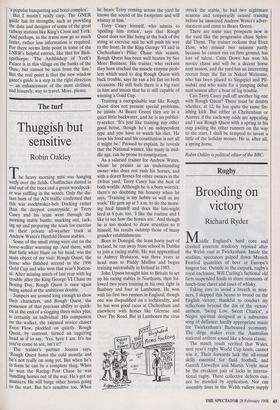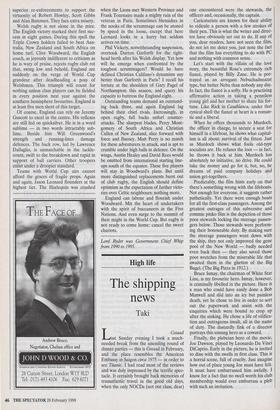Rugby
Brooding on victory
Richard Ryder
Middle England's hard core and crushed concrete tendency rejoiced after the Welsh rout at Twickenham. Inside the stadium, spectators gulped down Munich Festival quantities of beer at Europe's longest bar. Outside in the carpark, rugby's royal enclosure, Will Carling's factional old farts suspended feuds to share remnants of lunch-time claret and eases of whisky.
Taking care to avoid a breech in man- ners, I skipped this beano to brood on the English victory, thankful to conduct my reflections beyond the din of the victors' anthem, 'Swing Low, Sweet Chariot', a Negro spiritual designed as a subversive song of defiance: hardly appropriate music for Twickenham's Barboured yeomanry. The dirge makes even the Australian national anthem sound like a Sousa classic.
The match result verified that Wales, next year's rugby World Cup hosts, cannot win it. Their forwards lack the all-round skills essential for fluid football, and Gareth Llewellyn and Martin Voyle must be the creakiest pair of locks in interna- tional rugby. These collective defects can- not be mended by application. Nor can assembly lines in the Welsh valleys supply superior re-enforcements to support the virtuosity of Robert Howley, Scott Gibbs and Alan Batemen. They face extra misery.
Welsh rugby is not alone in the mire. The English victory marked their first suc- cess in eight games. During this spell the Triple Crown holders failed to beat Aus- tralia, New Zealand and South Africa on home turf. Clive Woodward, the English coach, as joyously indifferent to criticism as he is wary of praise, rejects rugby club rot that, swing low and behold, England are suddenly on the verge of World Cup grandeur after deadheading a posy of Welshmen. This triumph will count for nothing unless class players can be fielded in every position next year against the southern hemisphere favourites. England is at least five men short of this target.
Of course, England can rely on Jeremy Guscott to excel in the centre. His reflexes are still fed on quicksilver. He is in a word sublime — in two words intractably sub- lime. Beside him Will Greenwood's strength and running-lines damage defences. The back row, led by Lawrence Dallaglio, is unmatchable in the tackle- count, swift to the breakdown and rapid in support of ball carriers. Other troopers enlist under a droopier standard.
Teams with World Cup airs cannot afford the graces of fragile props. Again and again, Jason Leonard flounders at the highest tier. The Harlequin was crushed when the Lions met Western Province and Frank Tournaire made a mighty ruin of the veteran in Paris. Sometimes blemishes in the nooks of the scrummage can be atoned by speed in the loose, except that here Leonard looks in a hurry but seldom arrives on time.
Phil Vickery, notwithstanding suspension, overtook Darren Garforth for the tight- head berth after his Welsh display. Yet how will he emerge when confronted by the toughest scrummagers? Would he have defined Christian Califano's dynamism any better than Garforth in Paris? I recall his torture at the shoulders of Gary Pagel of Northampton this season, and query his capacity to buttress the England eight.
Outstanding teams demand an outstand- ing back three, and again England lag behind their chief rivals. Increasingly, in open rugby, full backs unfurl counter- attacks. The sharpest blades, Percy Mont- gomery of South Africa and Christian Cullen of New Zealand, slice forward with force and fluency. Matt Perry is no match for these adventurers in attack, and is apt to crumble under high balls in defence. On the wings, Austin Healey and David Rees would be omitted from international starting line- ups south of the equator. These five players will stay in Woodward's plans. But until more distinguished replacements burst out of club rugby, the English should define optimism as the expectation of further victo- ries over Celtic neighbours: nothing more.
England can labour and flourish under Woodward. Mix the heart of undertakers with the spirit of buccaneers in the Five Nations. And even surge to the summit of their might in the World Cup. But rugby is not ready to come home: cancel the sweet chariots.
Lord Ryder was Government Chief Whip from 1990 to 1995.



























































 Previous page
Previous page